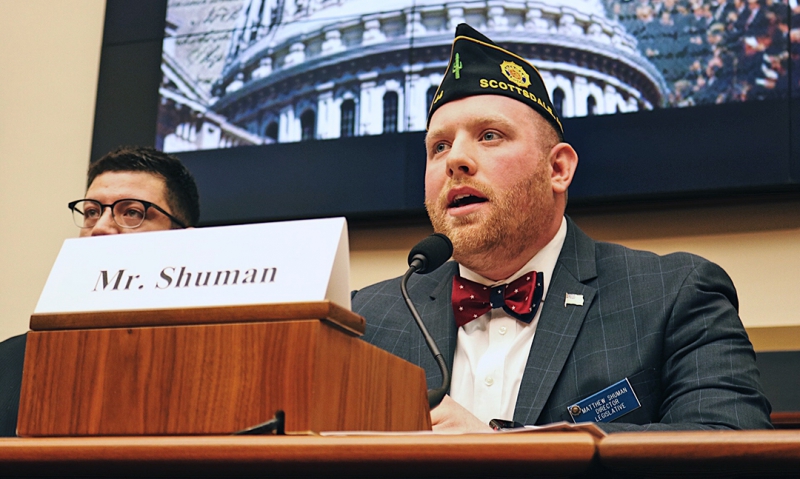
This legislation will give necessary protections for veterans by amending the Fair Credit Reporting Act.
American Legion National Legislative Division Director Matthew Shuman appeared before the House Financial Institutions and Consumer Credit Subcommittee on Jan. 9 to testify on House Resolution (H.R.) 2683, the Protecting Veterans Credit Act of 2017. The hearing was at the Rayburn House Office Building in Washington, D.C., and was part of a discussion focused on legislative proposals for a more efficient federal financial regulatory regime.
Shuman based his testimony on an Army veteran from Missouri, Frankie Adams, who was charged to pay a $300 balance on a Department of Veterans Affairs (VA) approved outpatient procedure in 2016.
“He was not instructed by the VA to pay, but rather the civilian non-VA doctor who couldn’t get paid from the VA because it was taking several months,” Shuman said. “So, the doctor charged Mr. Adams. His private insurance covered the majority of the $1,800 bill, minus the $300.”
Despite believing that VA was responsible for the cost of his procedure, Shuman said Adams had to pay the debt or it would be reported to a credit collector and negatively impact his personal credit history.
“The story I told is a story that many veterans have lived. The small difference is that Mr. Adams had the means to pay the charges,” Shuman said. “The simple reality is no veteran should ever have to pay for services that the VA is responsible for.”
If passed, H.R. 2683 will give necessary protections for veterans by amending the Fair Credit Reporting Act. This potential law would exclude, for one year, information related to their VA medical debt from being reflected in their credit report, according to Shuman.
“This common-sense bill will also provide veterans with the necessary tools to dispute VA medical debt information reported to credit reporting agencies,” he said. “Bottom line: veterans will no longer require assistance from attorneys and pay fees to resolve an issue that they had no role in creating.”
Shuman’s testimony also included a brief discussion about VA’s Choice program. He referenced the 2014 wait time scandal, which made national news amid controversy of an overworked and understaffed VA medical system.
Shuman said veterans have been dealing with the consequences of VA’s actions even prior to the implementation of the Choice Program. An important solution to the wait time scandal was allowing veterans to receive care in the community at the government’s expense.
Although the Legion supports H.R. 2683, Shuman shared a few recommendations to the committee that would help make the bill even stronger. He suggested that:
· Credit Reporting Agencies (CRAs) will need a mechanism to validate if someone is a veteran in order to process their claim;
· CRAs will also need to validate that the debt in question is a VA-approved service; and
· Congress should pass legislation directing VA to adhere to the Prompt Payment Act, which will assist veterans who have selflessly served the nation.
“Veterans like Mr. Adams deserve the best,” Shuman said. “The American Legion stands ready to assist in doing just that.”
- Legislative

